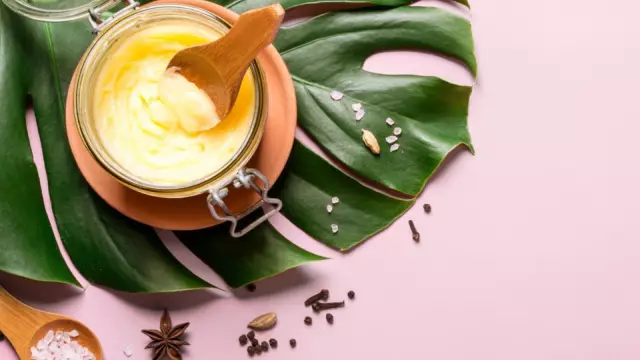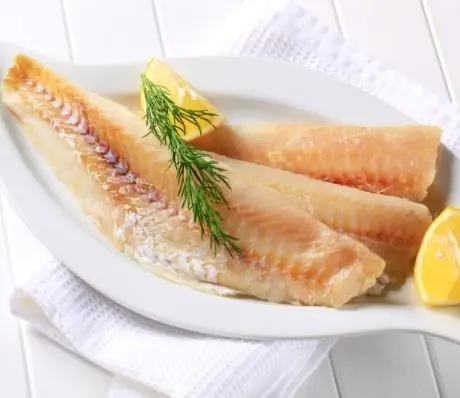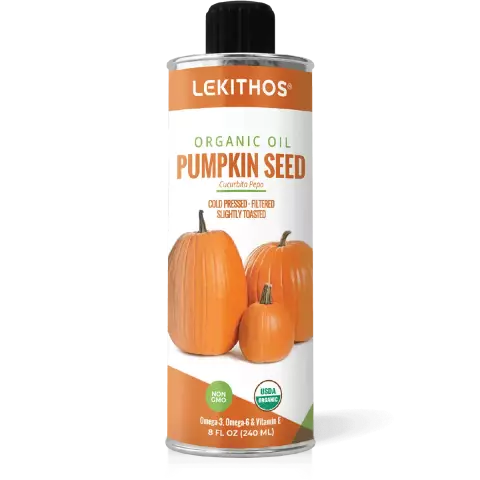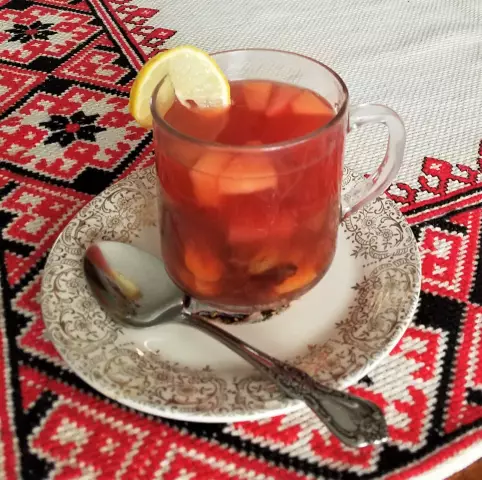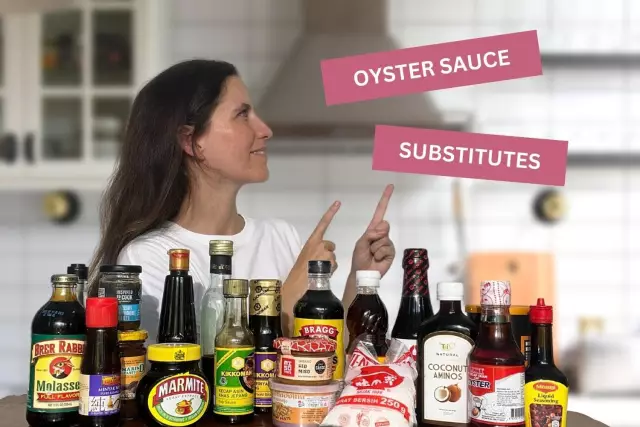Food
Last modified: 2025-11-02 20:11
Silver carp is a large fish of the Carp family, the size of an adult of which reaches one meter in length
Last modified: 2025-11-02 20:11
Ghee is a product obtained by removing water, protein components and lactose from butter
Last modified: 2025-11-02 20:11
Jerusalem artichoke is a perennial tuberous plant, for its dietary and medicinal properties is used as a substitute for potatoes
Last modified: 2025-11-02 20:11
Black cod - calories 200.9 kcal per 100 g. Proteins - 12.2 g, fats - 16.9 g, carbohydrates - 0 g
Last modified: 2025-11-02 20:11
Trumpeter - calorie content is 23.8 kcal per 100 g. Proteins - 17.1 g, fats - 0.4 g, carbohydrates - 2.8 g
Last modified: 2025-11-02 20:11
Trepang (sea ginseng, sea cucumber) is an echinoderm-type marine invertebrate
Last modified: 2025-11-02 20:11
The trebuha is the first proventriculus, the front of a bovine or bovine stomach. This product does not contain carbohydrates and therefore does not increase blood glucose levels
Last modified: 2025-11-02 20:11
Cod is a fish of the sturgeon family, which is valued for its nutritional value, juiciness and low energy value
Last modified: 2025-11-02 20:11
Truffle is an underground mushroom of the Truffle family, from which expensive delicacies are prepared
Last modified: 2025-11-02 20:11
Eel - calories 333 kcal per 100 g. Proteins - 14.5 g, fats - 30.5 g, carbohydrates - 0 g
Last modified: 2025-11-02 20:11
Tuna is a large fish of the Mackerel family, reaching 3 meters in length and 500 kg in weight
Last modified: 2025-11-02 20:11
Tulka is a small fish of the herring family, lives in the waters of the Black, Azov and Caspian seas
Last modified: 2025-11-02 20:11
Pumpkin is an annual or perennial herb of the pumpkin family. The fruits of the plant are eaten and contain a lot of nutrients, vitamins and microelements. Pumpkin pulp is used to prepare salads, desserts, juice and gruel for the treatment of skin diseases. Fresh pumpkin juice is indicated for insomnia, liver disease, edema, thrombosis and thrombophlebitis
Last modified: 2025-11-02 20:11
Pumpkin seed oil is a valuable product that has a beneficial effect on the functioning of the endocrine, muscle, cardiovascular, digestive and nervous systems
Last modified: 2025-11-02 20:11
Pumpkin seeds are famous for their rich content of substances useful to humans and numerous healing properties, their benefits have been scientifically proven
Last modified: 2025-11-02 20:11
Uzvar is a Ukrainian drink made from dried fruits, which was traditionally prepared for Christmas
Last modified: 2025-11-02 20:11
Dill is an edible herb of the Umbrella family. Due to its rich composition, dill has an expectorant, hypotensive, carminative, diuretic and laxative effect. Dill treatment normalizes metabolism in the body, improves the functioning of the gastrointestinal tract, helps with diseases of the liver, kidneys, biliary tract, arterial hypertension and atherosclerosis
Last modified: 2025-11-02 20:11
Grape snail - calorie content is 90 kcal per 100 g. Proteins - 16.1 g, fats - 1.4 g, carbohydrates - 2 g
Last modified: 2025-11-02 20:11
Oyster sauce - a product obtained from oyster meat, or in order to reduce the cost, from oyster extract
Last modified: 2025-11-02 20:11
Apricot - calorie content is 242 kcal per 100 g. Proteins - 5 g, fats - 0.4 g, carbohydrates - 53 g
Last modified: 2025-11-02 20:11
Canned white beans Bonduelle - calorie content is 99 kcal per 100 g. Proteins - 6.7 g, fats - 0.3 g, carbohydrates - 17.4 g
Last modified: 2025-11-02 20:11
Pheasant - caloric content is 253.9 kcal per 100 g. Proteins - 18 g, fats - 20 g, carbohydrates - 0.5 g
Last modified: 2025-11-02 20:11
Red beans - caloric content is 93 kcal per 100 g. Proteins - 8.4 g, fats - 0.3 g, carbohydrates - 13.7 g
Last modified: 2025-11-02 20:11
Duck eggs are not as common on the market as chicken eggs, because they have a specific taste and strong smell
Last modified: 2025-11-02 20:11
Canned red beans Bonduelle - calorie content is 99 kcal per 100 g. Proteins - 6.7 g, fats - 0.3 g, carbohydrates - 17.4 g
Last modified: 2025-11-02 20:11
White beans - calorie content is 298 kcal per 100 g. Proteins - 21 g, fats - 2 g, carbohydrates - 47 g
Last modified: 2025-11-02 20:11
Oysters - bivalve molluscs, invertebrates living in the seas with an asymmetric shell shape
Last modified: 2025-11-02 20:11
Duck - several genera of birds of the Duck family. Domesticated ducks are divided into three breeds: meat, egg and meat
Last modified: 2025-11-02 20:11
Asparagus beans - calorie content is 30 kcal per 100 g. Proteins - 2.5 g, fats - 0.2 g, carbohydrates - 4.55 g
Last modified: 2025-11-02 20:11
Black beans - caloric content is 132 kcal per 100 g. Proteins - 8.9 g, fats - 0.5 g, carbohydrates - 23.7 g
Last modified: 2025-11-02 20:11
Fennel - calories 31 kcal per 100 g. Proteins - 1.24 g, fats - 0.2 g, carbohydrates - 7.29 g
Last modified: 2025-11-02 20:11
Sea trout - calorie content is 157 kcal per 100 g. Proteins - 20.5 g, fats - 4.3 g, carbohydrates - 0 g
Last modified: 2025-11-02 20:11
Rainbow trout - calorie content is 119 kcal per 100 g. Proteins - 20.48 g, fats - 3.46 g, carbohydrates - 0 g
Last modified: 2025-11-02 20:11
Feijoa is a small evergreen shrub native to the tropics. The fruits are harvested unripe, the peel of which has a glossy sheen
Last modified: 2025-11-02 20:11
River trout - calorie content is 88 kcal per 100 g. Proteins - 17.5 g, fats - 2 g, carbohydrates - 0 g
Last modified: 2025-11-02 20:11
The date is the fruit of a plant of the Palm family (date palm). By their properties, dates are equated to useful cereals
Last modified: 2025-11-02 20:11
Fructose is a naturally occurring sugar, a carbohydrate found in sweet vegetables, fruits, berries and honey
Last modified: 2025-11-02 20:11
Physalis is a perennial plant up to 1 m high, the largest plant in the Solanaceae family
Last modified: 2025-11-02 20:11
Hazelnut is a large hazelnut fruit. The nut has a shape close to spherical and yellow-brown color
Last modified: 2025-11-02 20:11
Halva peanut - calorie content is 462 kcal per 100 g. Proteins - 11 g, fats - 32 g, carbohydrates - 44 g


